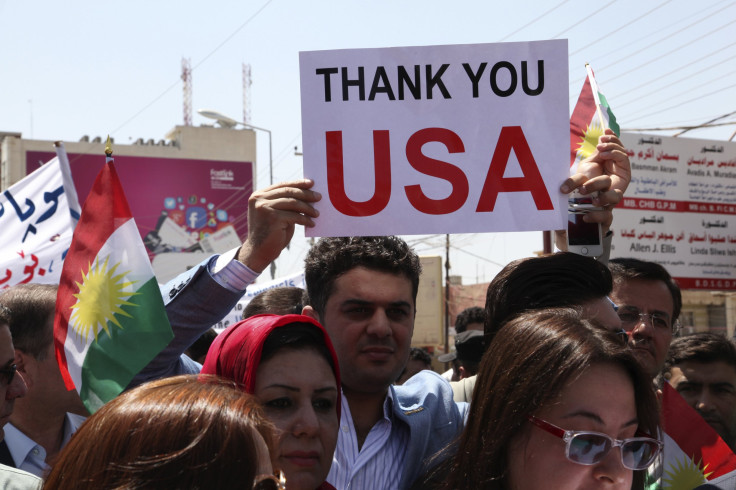Obama Statement On Iraq: President Praises Naming Of Prime Minister Haider Al-Abadi Amid US Airstrikes [Full Text]

President Barack Obama applauded the nomination of a new Iraqi prime minister Monday despite an escalating power struggle that could further threaten stability in the divided nation. Speaking from Martha’s Vineyard, Obama said Iraq has “taken a promising step forward” in nominating Haider Al-Abadi to succeed embattled Prime Minister Nouri Al-Maliki, who was forced out by Iraqi President Fouad Massoum earlier Monday amid worsening political tensions. Maliki has remained defiant, refusing to give up his position and calling his ouster unconstitutional.
Obama said he and Vice President Joe Biden called Al-Abadi to congratulate him and urge him to form a new cabinet as soon as possible. “The only lasting solution is for Iraqis to come together and form an inclusive government,” Obama said.
The statements come four days after Obama authorized targeted military airstrikes in Iraq’s Sinjar region, where thousands of Iraqi citizens, mostly members of the Yazidi minority, were trapped on a mountain with little food or water. Obama said the strikes have successfully prevented terrorist forces from advancing on the city of Irbil, where American civilians are present. He added that daily humanitarian efforts are providing “life-saving assistance” to the Iraqis still stranded on Mount Sinjar. During the weekend, some 20,000 civilians reportedly escaped from the mountain, but tens of thousands more remain.
Obama offered no timetable for an end to U.S. airstrikes, but urged Iraqi’s to “build on today’s progress, and come together to support a new and inclusive government.”
Read the full text of Obama’s statement below:
THE PRESIDENT: Good afternoon, everybody. I wanted to provide an update on recent developments in Iraq, including some important steps forward as Iraqis form a new government.
Over the past few days, American forces have successfully conducted targeted airstrikes to prevent terrorist forces from advancing on the city of Irbil, and to protect American civilians there. Kurdish forces on the ground continue to defend their city, and we’ve stepped up military advice and assistance to Iraqi and Kurdish forces as they wage the fight against ISIL.
At the same time, we’ve continued our daily humanitarian efforts to provide life-saving assistance to the men, women and children stranded on Mount Sinjar, and deployed a USAID Disaster Assistance Response Team to help. Some have begun to escape their perch on that mountain, and we’re working with international partners to develop options to bring them to safety. I want to thank in particular the United Kingdom, France and other countries working with us to provide much needed assistance to the Iraqi people. And, meanwhile, our aircraft remain positioned to strike any terrorist forces around the mountain who threaten the safety of these families.
This advances the limited military objectives we’ve outlined in Iraq: protecting American citizens, providing advice and assistance to Iraqi forces as they battle these terrorists, and joining with international partners to provide humanitarian aid. But as I said when I authorized these operations, there is no American military solution to the larger crisis in Iraq. The only lasting solution is for Iraqis to come together and form an inclusive government -- one that represents the legitimate interests of all Iraqis, and one that can unify the country’s fight against ISIL.
Today, Iraq took a promising step forward in this critical effort. Last month, the Iraqi people named a new president. Today, President Massoum named a new Prime Minister-designate, Dr. Haider Al-Abadi. Under the Iraqi constitution, this is an important step towards forming a new government that can unite Iraq’s different communities.
Earlier today, Vice President Biden and I called Dr. Abadi to congratulate him and to urge him to form a new cabinet as quickly as possible -- one that’s inclusive of all Iraqis, and one that represents all Iraqis. I pledged our support to him, as well as to President Massoum and Speaker Jabouri, as they work together to form this government. Meanwhile, I urge all Iraqi political leaders to work peacefully through the political process in the days ahead.
This new Iraqi leadership has a difficult task. It has to regain the confidence of its citizens by governing inclusively and by taking steps to demonstrate its resolve. The United States stands ready to support a government that addresses the needs and grievances of all Iraqi people. We are also ready to work with other countries in the region to deal with the humanitarian crisis and counterterrorism challenge in Iraq. Mobilizing that support will be easier once this new government is in place.
These have been difficult days in Iraq -- a country that has faced so many challenges in its recent history. And I’m sure that there will be difficult days ahead. But just as the United States will remain vigilant against the threat posed to our people by ISIL, we stand ready to partner with Iraq in its fight against these terrorist forces. Without question, that effort will be advanced if Iraqis continue to build on today’s progress, and come together to support a new and inclusive government.
© Copyright IBTimes 2024. All rights reserved.






















